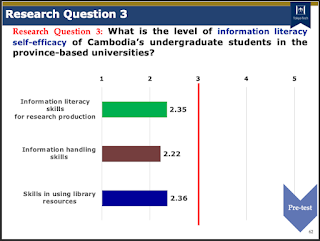IR vol 26: Undergraduate information literacy self-efficacy: a cross-sectional study of Cambodian provincial universities
This work is led by Cheyvuth Seng, former dean at the National University of Battambang who completed his doctoral studies at the Cross Lab.
 |
| Cheyvuth's public presentation slide summarizing one of the results of this paper |
For a copy of relevant materials (e.g., presentation, paper) or any questions you may have, please feel free to reach out to me through the Contact Me gadget on this blog's sidebar.
Details
Title: Undergraduate information literacy self-efficacy: a cross-sectional study of Cambodian provincial universities
Authors: Cheyvuth Seng, May Kristine Jonson Carlon, Jeffrey S. Cross
Venue: Information Research
Specifics: Volume 26, Number 3, September 2021, paper 193, University of Borås
DOI: 10.47989/irpaper903 (open access)
Abstract
Introduction. This paper examines the information literacy self-efficacy of undergraduate students at provincial universities in Cambodia and determines whether there are significant differences in information literacy self-efficacy in terms of sex, academic year, faculty, and university.
Method. We adapted the information literacy self-efficacy skills survey by Kurbanoglu and administered it to 1,009 undergraduate students at three public provincial universities to measure their confidence in information literacy.
Analysis. Descriptive and inferential statistics using independent sample t-test (t-test) and analysis of variance (ANOVA) were used to analyze the responses.
Results. The results indicated that the information literacy self-efficacy of provincial universities in Cambodia was low as the mean scores were lower than the midpoint value of the original scale. Significant differences were also observed across the faculties and universities. This study revealed no significant difference in information literacy self-efficacy between male and female students. However, a significant difference was observed between universities due to the performance of infrastructures and supporting funds.
Conclusions. The findings indicated that undergraduate students at the provincial universities in Cambodia exhibited low confidence in information literacy. Policymaking on information and communication technologies should be well implemented to provide practical skills to students from the first to the fourth year.
Comments
Post a Comment